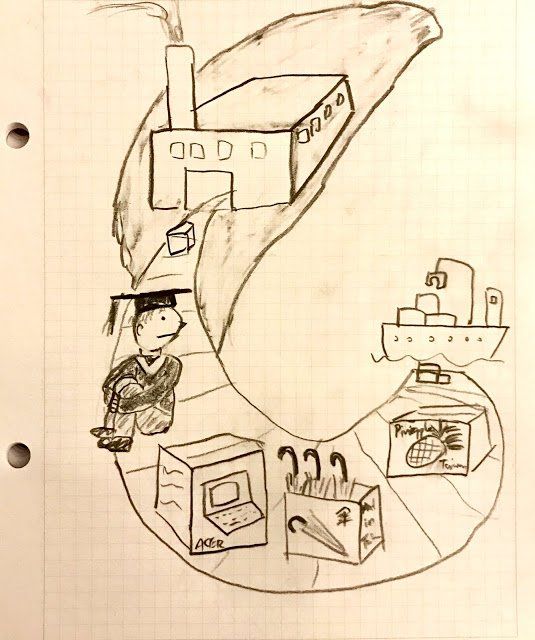What is unique about Taiwanese that found me a job in Switzerland?
According to Oxford Economics report “ Global Talent 2021 ”, Taiwan is facing the strongest threat of talent deficient among developed countries. Young Taiwanese are going abroad to study and find jobs, hoping for better compensations and career outlook. When I now count on Facebook among my friends from my student days, 30% of them are working or living abroad. Most of them are in US, Japan, and China.
Thinking about the situation, we could discuss why Taiwanese companies are struggling to attract talent and what can we do about it. But on the flip side, I am curious why my Taiwanese peers are so competitive in finding a job abroad? Is it something in our culture, education or society that gives us a competitive edge then other Asian graduates?
Flipping through Facebook friend profile and thinking back of our own story coming to Switzerland, I boiled it down to three things. Taiwan has raised a generation of youngsters to be easy-going, risk adverse people who care about others. These traits combined with high education degrees, makes young Taiwanese attractive employees for foreign companies.
Easy going is a virtue in Taiwan. Young Taiwanese adore politicians and celebrities that are down to earth, unpolished and authentic. The election of Ko Wen-je, a doctor with no political background as Mayor of Taipei illustrates this trend. Ko is known for his candid and practical voice, which won him the support of Taiwanese youngsters.
Why are we Taiwanese so easy-going? It might be the history of the island, which has been formed by Spanish, Dutch, Japanese, Americans and Chinese over time. Under the influence of various foreign powers, Taiwanese people learned how to thrive under pressure. Maybe its the tight community that encourage people to be in good terms with everyone else. After all, it is a small island, and you wouldn’t be surprised to find out that you have multiple mutual friends with some complete strangers on Facebook.
For myself, I noticed when I was studying for my MBA, I was recognized as “the guy that always wears casual” compared to my other Asian classmates. Even the MBA program director felt the need to remind me to wear formally when we had guest speakers. For me, what people wear does not matter, but rather what value you can offer to others.
Because of my easy-going nature, I found that I am more calm then others when discussions heat up. When I was interviewing for my job, I was asked to role play difficult customer conversations with my interviewer, and take and give criticism. My easy-going was a big plus for my profile, since in the medical industry it is crucial to know how to drive a conversation without crossing the line with healthcare professionals.
In my daily work, I noticed that because my colleagues consider me as an easy going person, they tend to easily put down their guards. At work, I often make jokes about myself and I show little desire to impress others. As a result, my colleagues are more willing to share info with me or support my ideas.
In general, Taiwanese people are risk adverse and happy with what they have. In a study comparing 23 developed countries, Taiwan was the most risk adverse country among all. This means as Taiwanese people becomes wealthy, we tend to secure our gains instead of venturing onwards.
This characteristic reflects both in homes and workplaces. At home, parents teach children that greed is bad, and you should cherish what you have. At workplaces, employees are often asked to play it safe. Instead of risky long term research or investments, Taiwanese companies tend to prefer production scale up or efficiency improvement projects.
Being risk adverse means Taiwanese people tend to be modest and conservative about their capabilities. Also, a risk adverse person tends to accept rather then change the status quo. As a result, Taiwanese people are often seen as hard working, compliant employees with predictable actions. Employees you can trust to keep the daily business running smoothly.
While working in Switzerland, this Taiwanese mindset still follows me. For example, I am more eager then my colleagues to try to answer my boss’ requests as much as I can. It feels so natural for me. In comparison, my European colleagues tend to argue more with my boss, to an extend that sometimes I wonder if they simply enjoy the debate process itself.
In general, Taiwanese people care for others more. According to the world giving index 2016 , Taiwanese people are more generous then some developed Asian and European countries. According to an expat survey, Taiwan was number one in hospitality in the world , and more then a third of the expats considered permanent residence in Taiwan.
Why are Taiwanese people so friendly towards others? I have two guesses: security and recognition. Taiwan society is weaved by several safety nets: good public healthcare , tight social communities, high saving ratios and low crime rate. As a result, young Taiwanese people has developed a high level of trust towards strangers to offer or ask for help. The second reason might come from Taiwan’s political status as not being recognised by the UN as a country. This leads to the islanders’ longing for international recognition. We want to showcase our best, not to impress but to be appreciated by other nations.
Translating this personality into working in an international team, I find myself usually becoming the mediator. We Taiwanese like to pull people together, never mind the leg work, and encourage others to speak up to issues. When dispute rises among the group, Taiwanese people felt the urge to call for group meetings to address the disputes. We even have create one specific word in Taiwanese, 喬(ts’iau´), which means “to mediate”.
So to sum it up, I believe more and more Taiwanese youngsters will choose to work abroad for the next few years. This is not only because they seek for an international career outlook, their profile also attracts foreign companies. This is not always a bad thing. As traditional local companies suffer from talent deficient, new types of companies and new regulations will emerge, accompanied with younger generations and new startups that carry ideas from years of abroad experienced. Like a surfer in the ocean, never try to fight the wave, but paddle along and ride with it.







